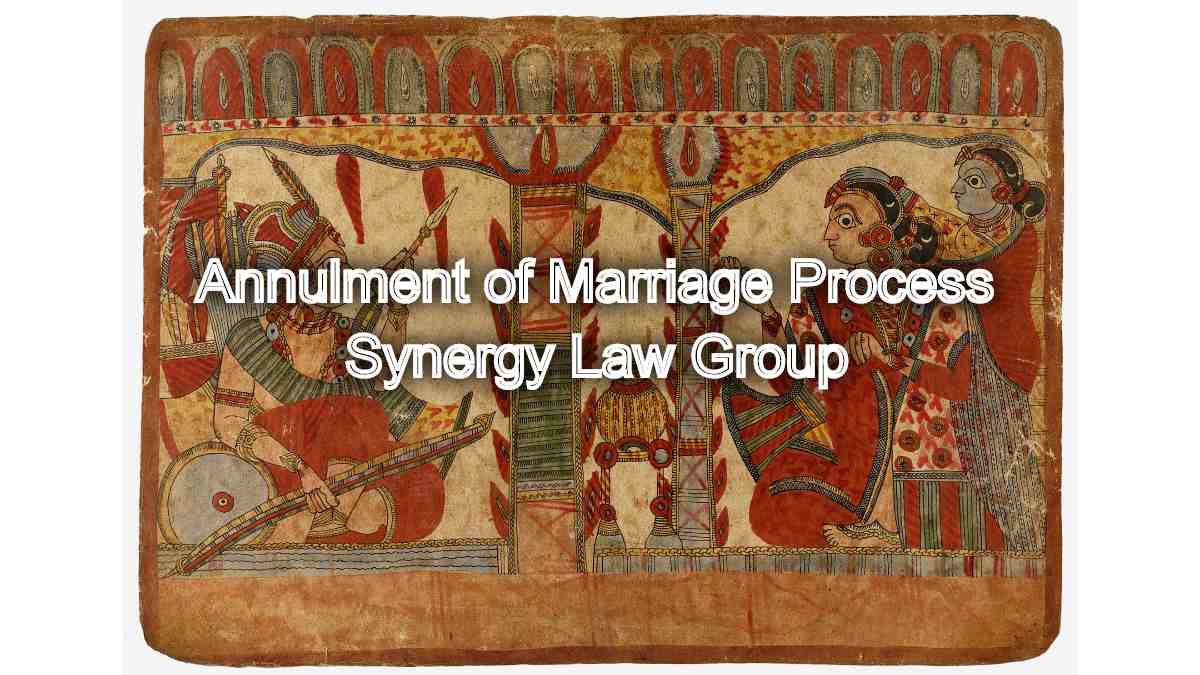Annulment of Marriage Process: Marriage, a sacred bond, sometimes faces unforeseen challenges that may lead to its dissolution. While divorce is a common solution, annulment is another legal process that can nullify a marriage, treating it as if it never existed. If you’re considering an annulment, seeking expert legal advice is crucial to navigate the complexities of the legal process.
Annulment of Marriage Process: Top-Rated Family Court Legal Advisor’s Expertise: Synergy Law Group
Understanding Annulment
Annulment is a legal process that declares a marriage null and void, as if it never existed. Unlike divorce, which dissolves an existing marriage, annulment erases the marriage from the legal record. To obtain an annulment, one must prove that the marriage was invalid from the beginning due to specific legal grounds.
Common Grounds for Annulment
The specific grounds for annulment vary by jurisdiction, but some common grounds include:
- Fraud: One spouse intentionally misrepresents significant facts about themselves, such as their identity, financial status, or criminal history.
- Bigamy: One spouse is already married to another person at the time of the marriage.
- Consanguinity or Affinity: The spouses are too closely related, such as siblings or first cousins.
- Mental Incapacity: One spouse is mentally incapable of understanding the nature of marriage.
- Lack of Consent: One spouse is coerced or forced into the marriage.
- Non-Consummation: The marriage is not consummated due to physical or psychological reasons.
The Annulment Process
The annulment process can be complex and time-consuming. It typically involves the following steps:
- File a Petition: The spouse seeking the annulment files a petition with the family court, outlining the grounds for the annulment.
- Serve the Petition: The petition is served on the other spouse, informing them of the annulment proceedings.
- Discovery Phase: Both parties exchange information, such as financial records, medical records, and other relevant documents.
- Mediation or Counseling: In some cases, the court may order mediation or counseling to resolve the issues amicably.
- Trial: If the parties cannot reach an agreement, a trial is held to determine the validity of the marriage and the grounds for annulment.
- Judgment: The court issues a judgment granting or denying the annulment.
The Role of a Family Law Attorney
A skilled family law attorney can significantly assist you throughout the annulment process. They can:
- Provide Legal Advice: Advise you on the best course of action and the potential outcomes of the case.
- Draft Legal Documents: Prepare the necessary legal documents, such as the petition, responses, and motions.
- Represent You in Court: Advocate for your rights in court and present a strong case.
- Negotiate with the Other Spouse: Negotiate with the other spouse or their attorney to reach a fair settlement.
- Handle Complex Legal Issues: Address complex legal issues, such as child custody, child support, and property division.
Why Choose Synergy Law Group?
Synergy Law Group is a renowned law firm specializing in family law, including annulment proceedings. With a team of experienced attorneys, they are dedicated to providing personalized legal services to their clients.
Key Advantages of Choosing Synergy Law Group:
- Expertise: The firm’s lawyers have a deep understanding of family law and annulment proceedings.
- Personalized Attention: Each client receives individual attention and tailored legal strategies.
- Strong Negotiation Skills: The lawyers are skilled negotiators who can secure favorable settlements.
- Litigation Experience: The firm has a proven track record of success in family court proceedings.
- Client-Centric Approach: The firm prioritizes the needs and concerns of its clients.
- Affordable Fees: The firm offers competitive fees and flexible payment plans.
FAQs: Annulment of Marriage
Annulment is a legal process that declares a marriage null and void, as if it never existed. Unlike divorce, which dissolves an existing marriage, annulment erases the marriage from the legal record.
Common grounds for annulment include:
Fraud
Bigamy
Consanguinity or affinity
Mental incapacity
Lack of consent
Non-consummation
The duration of the annulment process can vary depending on various factors, including the complexity of the case, the jurisdiction, and the cooperation of both parties. It can take several months or even years to finalize an annulment.
The costs associated with an annulment can vary depending on the complexity of the case, the fees charged by the attorney, and court costs. It’s advisable to consult with a lawyer to get an estimate of the potential costs.
An annulment can have significant legal and financial implications, such as:
Division of property
Child custody and support
Alimony
Tax implications
Impact on future marriages
Conclusion
If you’re considering an annulment, it’s crucial to seek the guidance of a qualified family law attorney. Synergy Law Group can provide the legal expertise and support you need to navigate the complexities of the annulment process and achieve a favorable outcome. By choosing Synergy Law Group, you can rest assured that your case is in the hands of experienced professionals who are dedicated to protecting your rights and achieving your goals.
Read More
- Adultery Laws Explained: Senior Family Court Legal advisor’s Expertise
- Annulment of Marriage: How to find the Best Lawyers?
- Alimony Disputes: Best Ranking Family Court Advocate’s Legal Strategies
- Adultery Laws Explained: Senior Family Court Legal advisor’s Expertise
- Spouse Cheating and Its Legal Ramifications: Top Ranking Family Court Advocate’s Advocacy
- Ministry of Law and Justice:

